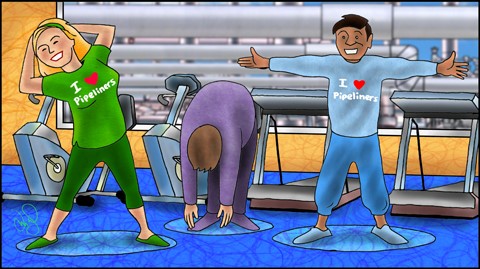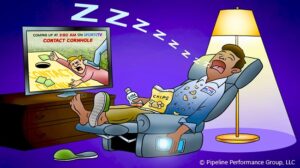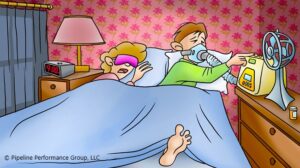Take Time for Fitness
Many control rooms have provided either exercise equipment or even added an exercise room for their controllers and other personnel. A few controllers take advantage of that equipment as a fatigue countermeasure during breaks from the console. Most controllers do not. I wonder why.
Some of the reasons people give for not taking breaks from the console include:
- Workload does not allow me to leave the console
- No one else is available or qualified to perform the covered tasks at the console
- Something might happen while I am away from the console and I am accountable for operations while I am on shift
- The exercise room or the equipment is too far away from the console
- Even though we have equipment, its use is not encouraged by management
- I have some physical limitations that hinder my ability to exercise
All of those reasons are genuine and understandable. Some of us don’t think it’s worth the effort to take an exercise break, even if we had the opportunity.
All of us know that exercise is beneficial for many reasons, including as a fatigue countermeasure. Look at the picture of the people stretching and how invigorated two of the people look. The third person, even though we cannot see his face, is bending to touch his toes. I feel like that guy most of the time. I know the benefits of exercise and I have fitness minded colleagues who remind me of those benefits regularly. Yet I seem to think if I can’t exercise for at least 30 minutes; it’s not worth the effort. Here’s something I am learning. I do not have to exercise for a long period of time in order to receive some benefits from exercise.
I recall a controller who pulled an exercise bike over to his console one night, while we were doing a workload assessment and a control room assessment. There were no active operations during that time and he pedaled on the bicycle for about ten minutes while continuing to monitor the SCADA displays. He then had to stop to respond to an alarm. When he completed that response, he got back on the bike and pedaled for another five minutes. He took time for fitness and said he felt much better.
Due to his example, I used their treadmill for ten minutes myself. I felt better. Scarlet Knight, one of our fitness minded consultants, developed some “alertness exercises” that can be done anywhere. We provide cards that illustrate those exercises so people can use them at the consoles simply by standing and doing simple stretches.
Let’s get serious about the effects of shiftwork on our health and well being. If I sit for 12 hours at a console, only arising occasionally for restroom breaks or to get a caffeinated drink, I am harming myself. If I stand up a few times during the shift, stretch a few times, use some light weights or an exercise band, I will feel better.
Last week, I observed four gas control operators who took advantage of their sit/stand consoles to stand several times during the shift. This organization staffs with four operators for three consoles so that each person can take breaks during the shift. The provision of breaks is made possible by the fact that all are cross-trained and the company overstaffing to allow for breaks. This is a best practice. If all companies took this approach, task-related fatigue and sleep-related fatigue could be reduced.
Off the job, shiftworkers need to exercise three to five days each week for a total of 30-45 minute each day. One of the benefits to exercise is that it lowers blood pressure and resting heart rate. I recently had to go to the emergency room and my blood pressure was very high. I figured out the cause was job-related stress, complicated by my obesity. It provided a wake up call and I am now, for about the hundredth time in my life, paying more attention to stress reduction. I think we all know what to do: adequate sleep, healthful foods, adequate hydration from water, and regular exercise. Take time for fitness, take breaks on the job, and use off duty time wisely. You are too important to your loved ones and your colleagues and to me not to practice habits that counteract the effects of shiftwork.
MANAGING FATIGUE EDUCATIONAL PROGRAM | Charles Alday © 2017 Please Distribute to Others.




